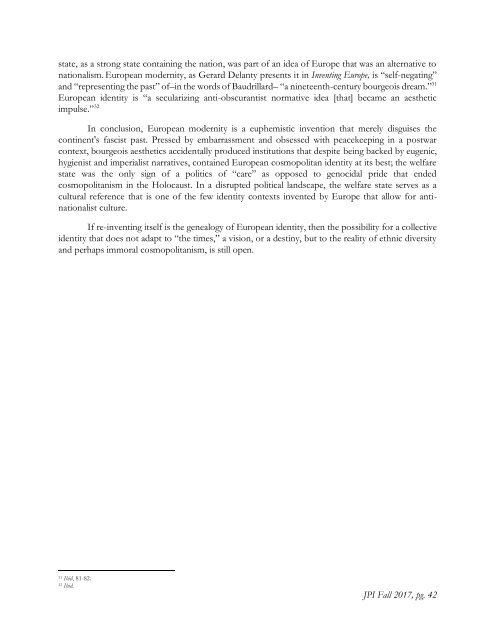Fall 2017 JPI
You also want an ePaper? Increase the reach of your titles
YUMPU automatically turns print PDFs into web optimized ePapers that Google loves.
state, as a strong state containing the nation, was part of an idea of Europe that was an alternative to<br />
nationalism. European modernity, as Gerard Delanty presents it in Inventing Europe, is “self-negating”<br />
and “representing the past” of–in the words of Baudrillard– “a nineteenth-century bourgeois dream.” 31<br />
European identity is “a secularizing anti-obscurantist normative idea [that] became an aesthetic<br />
impulse.” 32<br />
In conclusion, European modernity is a euphemistic invention that merely disguises the<br />
continent's fascist past. Pressed by embarrassment and obsessed with peacekeeping in a postwar<br />
context, bourgeois aesthetics accidentally produced institutions that despite being backed by eugenic,<br />
hygienist and imperialist narratives, contained European cosmopolitan identity at its best; the welfare<br />
state was the only sign of a politics of “care” as opposed to genocidal pride that ended<br />
cosmopolitanism in the Holocaust. In a disrupted political landscape, the welfare state serves as a<br />
cultural reference that is one of the few identity contexts invented by Europe that allow for antinationalist<br />
culture.<br />
If re-inventing itself is the genealogy of European identity, then the possibility for a collective<br />
identity that does not adapt to “the times,” a vision, or a destiny, but to the reality of ethnic diversity<br />
and perhaps immoral cosmopolitanism, is still open.<br />
31 Ibid, 81-82.<br />
32 Ibid.<br />
<strong>JPI</strong> <strong>Fall</strong> <strong>2017</strong>, pg. 42
















